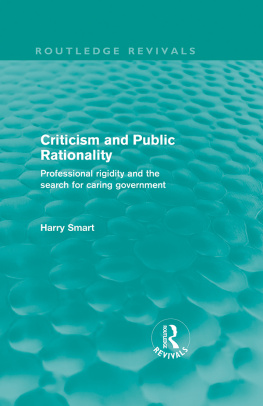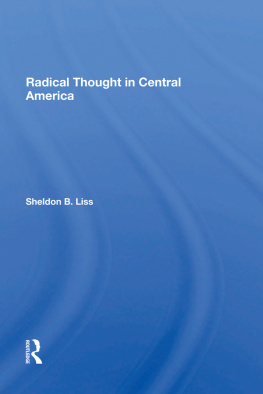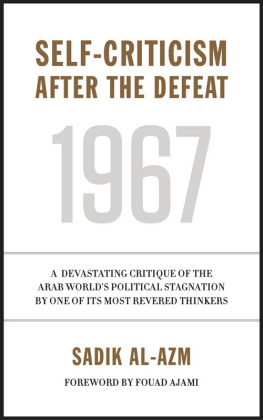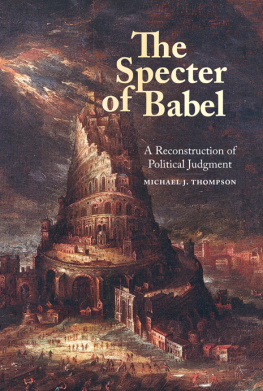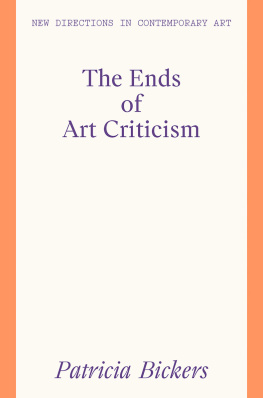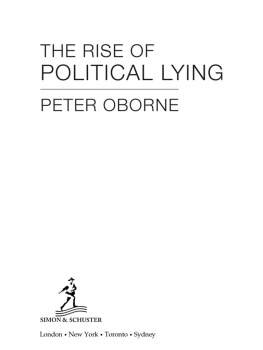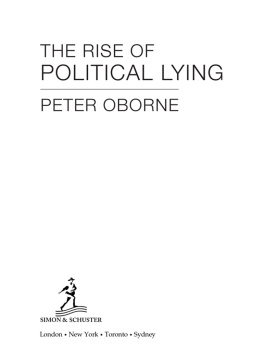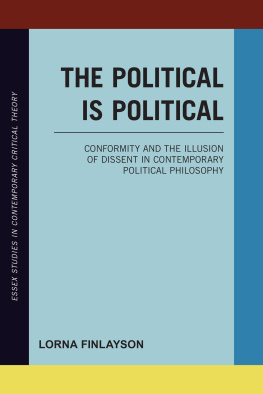REVIEWING POLITICAL CRITICISM
Public Intellectuals and the Sociology of Knowledge
Series Editors
Dr Andreas Hess, University College Dublin, Ireland
Dr Neil McLaughlin, McMaster University, Canada
The sociology of knowledge has a long and distinctive history. Its function has always been that of attempting to bridge the aspirations of the discursive and institutional founding fathers of sociology with that of modern attempts to define the discipline through the study of the emergence, role and social function of ideas. However, since Mannheim first outlined his program in the 1920s, the sociology of knowledge has undergone many changes. The field has become extremely differentiated and some of its best practitioners now sail under different flags and discuss their work under different headings. This new series charts the progress that has been made in recent timesdespite the different labels. Be it intellectual history Cambridge-style, the new sociology of ideas which is now gaining strength in North America, or the more European cultural analysis which is associated with the name of Bourdieu, this series aims at being inclusive while simultaneously striving for sociological insight and excellence. All too often modern attempts in the sociology of knowledge, broadly conceived, have only looked at form while they downplayed or disregarded content, substance of argument or meaning. This series will help to rectify this.
Reviewing Political Criticism
Journals, Intellectuals, and the State
ELISABETH K. CHAVES
Virginia Tech, USA
ASHGATE
Elisabeth K. Chaves 2015
All rights reserved. No part of this publication may be reproduced, stored in a retrieval system or transmitted in any form or by any means, electronic, mechanical, photocopying, recording or otherwise without the prior permission of the publisher.
Elisabeth K. Chaves has asserted her right under the Copyright, Designs and Patents Act, 1988, to be identified as the author of this work.
Published by
Ashgate Publishing Limited
Wey Court East
Union Road
Farnham
Surrey, GU9 7PT
England
Ashgate Publishing Company
110 Cherry Street
Suite 3-1
Burlington, VT 05401-3818
USA
www.ashgate.com
British Library Cataloguing in Publication Data
A catalogue record for this book is available from the British Library
The Library of Congress has cataloged the printed edition as follows:
Chaves, Elisabeth K.
Reviewing political criticism : journals, intellectuals, and the state / by Elisabeth K. Chaves.
pages cm
Includes bibliographical references and index.
ISBN 978-1-4724-3004-5 (hardback) ISBN 978-1-4724-3005-2 (ebook) ISBN 978-1-4724-3006-9 (epub) 1. Political science--History. 2. Political science--Philosophy. 3. Intellectuals--Political activity--History. 4. Criticism--Political aspects. 5. Journalism--Political aspects. 6. State, The. I. Title.
JA81.C5264 2015
320--dc23
2014028898
ISBN 9781472430045 (hbk)
ISBN 9781472430052 (ebk PDF)
ISBN 9781472430069 (ebk ePUB)
Contents
List of Tables
Preface
Barbara Epstein, co-founder and co-editor of The New York Review of Books, passed away as I was starting this project. A number of obituaries and retrospectives appeared, and they left me with a sense that there was, or is, a real intellectual community out there somewhere. To the eyes of a studious suburbanite raised in a mass-media entertainment soaked environment, this community existed in a some-place where ideas and writing are paramount, perhaps influential and even a little alluring. When my first academic article appeared in a respected scholarly journal, I flipped through the pages of the issue in which my article appeared and felt no allure or influence. While ideas were discussed, they were not paramount and mostly lay heavy on the page. There was a divide, a disconnect, between the community of scholars and the intellectual community. The scholarly journal is the home of the academic, and the journal of opinion that of the intellectual.
An article on Epstein and The New York Review of Books by James Atlas (2006) in particular attracted my attention. It portrayed the environment, accurately or not, of an intellectual community, writers rubbing elbows with other writers, erudite editors dictating letters to eager interns, and the production of a periodical described as the premier journal of the American intellectual elite. Moreover, a journal like The New York Review of Books was a place where questions of politics and culture could be investigated side by side. Any issue could contain politics, economics, philosophy, history, art, sociology, psychology, astronomy, and literary criticism, as well as original poetry. One was not confined to disciplinary boundaries. In the journals first issue in 1963, the lengthy table of contents included, among others, a piece by Dwight MacDonald titled To the Whitehouse, a review essay by Oscar Glass on Russian economic development, a review essay by Susan Sontag on Simone Weil, a review essay by Nathan Glazer on Herbert Ganss The Urban Villagers, and poetry by Robert Lowell, John Berryman, and Robert Penn Warren.
Critics have rightly described The New York Review of Books as political, its politics progressive or to the left. However, Philip Nobile (1974) argued that by the early 1970s the Reviews politics lacked any bite. While this may have been true, the Reviews politics reemerged strongly after 9/11 and the Iraq War (Sherman 2004; Atlas 2006). However, the Review itself has never put forth an explicit political program. It has only published one statement of editorial intent and that appeared in its first issue as a letter To the Reader. In it, there was no mention of politics whatsoever. Instead, the editors expressed their hopes that the review would serve as the type of literary journal that is needed in America. They would not spend time on books that are trivial in their intentions or venal in their effects. The only explicit description they gave of the new endeavor was that it would be a responsible literary journal (Epstein and Silvers 1963). They left open the questions of responsible to whom and to what.
I had a fairly parochial upbringing and education, and growing up, I did not really know of the existence of reviews and journals such as The New York Review of Books. I had seen The New Yorker and read a few issues. I had read The Economist and browsed other current affairs magazines at bookstores. But prior to my doctoral degree, no professor had ever urged me to pick up the latest issue of Dissent. They had never assigned essays from Salmagundi as part of my course reading. Course readers, packets of articles that supplemented textbooks, might contain articles from scholarly journals or even from some of the leading news magazines, but I do not remember them containing anything from journals of opinion, like The New York Review of Books, The Nation, or The New Republic, or from other less widely read, non-academic journals, like Telos or Monthly Review.
I have re-read Atlass article on The New York Review of Books several times since 2006. As I read it yet again in order to write this preface, I noticed something new almost immediately, something that I had previously ignored or glossed over. His depiction of Epsteins work and the Review itself is suffused with glamour. First, there are the parties. Atlas writes of literary cocktail parties, Truman Capotes Black and White Ball at the Plaza; he even describes how their [the Epsteins] parties were famous. The settings are enviable and exotic: a leafy street lined with elegant old apartment buildings known for their wood-paneled walls and double-height living rooms, marble pillars and chandeliers, the remote farmhouse in Provence, France! A Thames River barge moored on the right bank of the Seine, Paris! The lifestyle is luxurious: pot-au-feu, coq au vin, boeuf bourguignon, bottles of champagne, high-toned benefactors, trust fund, hunting dogs, a man coiffed and tanned, in a beautiful suit like someone out of a movie.
Next page

